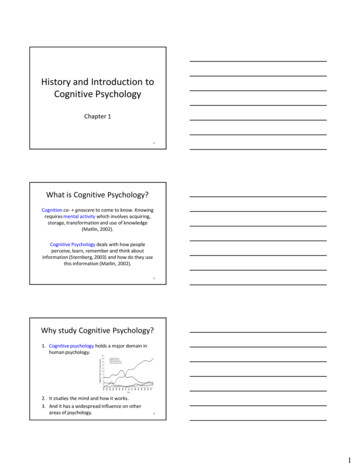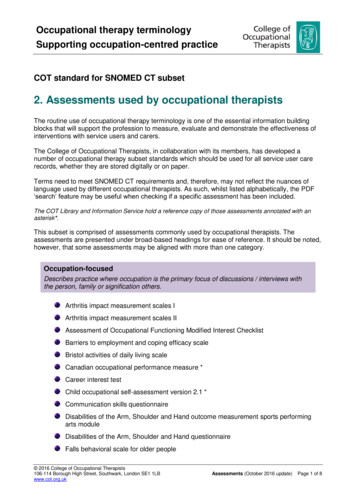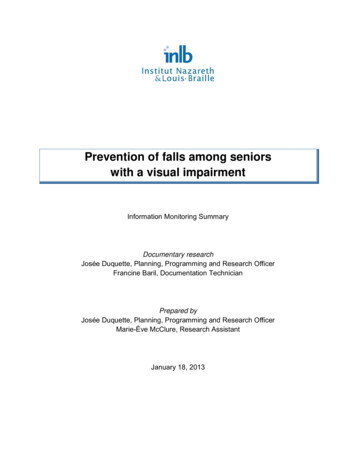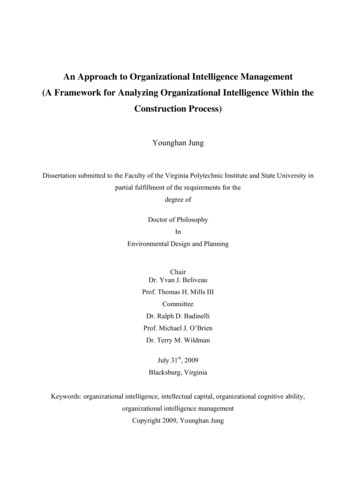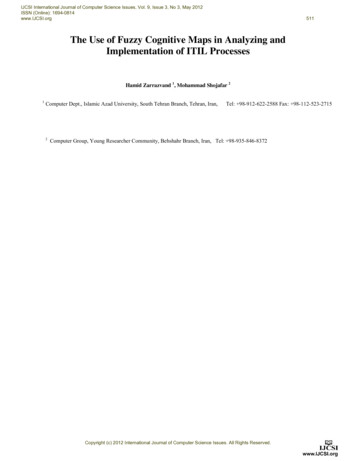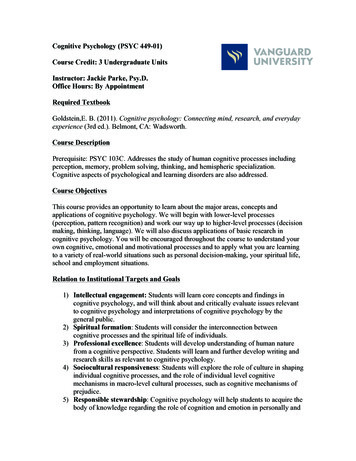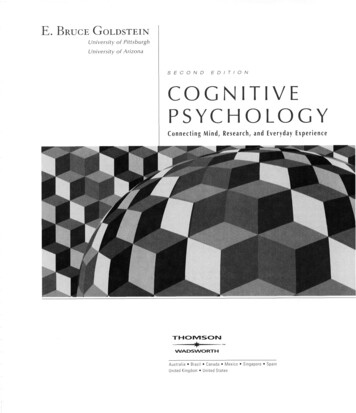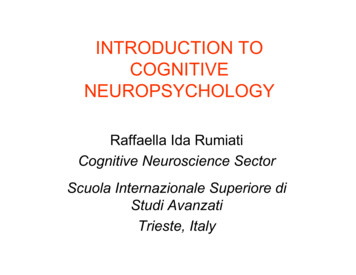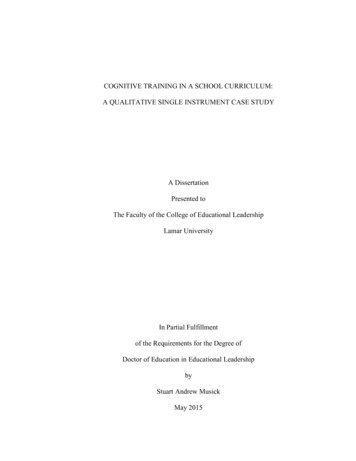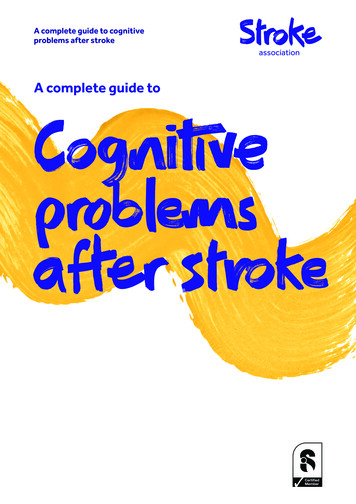
Transcription
A complete guide to cognitiveproblems after strokeA complete guide toCognitiveproblemsafter stroke
A stroke can affect the way your brain understands,organises and stores information. This is known ascognition.This guide explains the different ways a stroke canaffect your cognition, the problems this can cause andwhat you can do about them. It’s aimed at people whohave had a stroke but there is information for familyand friends as well.We have information on all aspects of stroke.If you have a question that is not answered in thisguide visit stroke.org.uk or call our Stroke Helplineon 0303 3033 100.2Cognitive problems after stroke
What’s in this guide?Why has my cognition been affected?4What kinds of problems can this cause?5Problems with concentration5Memory problems6Problems with planning and problem-solving7Problems noticing things on one side8Problems moving or controlling your body9Problems with movement and finding your way around9Confusion and denial10Problems recognising things11Will it get better? 12Are there treatments that can help?13What can I do about my cognitive problems?14What can I do about my concentration?16What can I do about my memory?17What can I do about my planning and problem-solving?19What can I do about other cognitive problems?19Where to get help and information20From the Stroke Association20Other sources of help and information21Tips for family and friends22About our information23Cognitive problems after stroke3
Why has my cognition been affected?Every second you receive a huge amount ofinformation from the world around you, whichyour brain has to understand, organise andkeep. This is called cognition.If your cognition is affected, then you couldfind it difficult to concentrate or remembercertain things. You may also find it difficult towork out how to do something or know how torespond to what’s going on around you. Thisis what people mean when they talk aboutcognitive problems or cognitive impairment.Cognitive problems happen because ofdamage to your brain. Different parts of yourbrain control different things. If one of theparts of your brain that control cognition isdamaged by a stroke, then this can affectyour ability to do certain things.Cognitive problems are very common aftera stroke. They can have an impact on theperson and can also affect their family andrelationships.Noticing cognitive problemsIt can be difficult to notice cognitiveproblems when you’re in hospital. Onthe stroke unit there’s always a lot goingon and you tend to get a lot of help witheveryday things (nurses will remind youwhen to take your medication or help youfind your way around, for example).Because of this, many people don’t noticethat they have problems until they returnhome. Even then, you may not notice untilyou go back to work or start to do moredemanding activities again, such as driving.When you’re in hospital, your stroke teamshould complete an assessment withyou to find out if you have any cognitiveproblems. However, these cognitiveassessments will only pick up on severeproblems. More detailed assessments areneeded to find less obvious problems, butthese are used less often.4Cognitive problems after stroke
What kinds of problems can this cause?Problems with concentrationWhen you concentrate on something, yourbrain has to screen out a lot of informationcoming in from the world around you. Astroke can affect your brain’s ability to dothis. Concentration problems are especiallycommon in the early stages after a stroke.Problems with concentration can affect youin different ways, as we rely on it for all ofour other thinking processes. If you find ithard to focus on something, then you’re notgoing know how to respond to it or be able toremember it later.Other effects of stroke can make yourconcentration worse too. Tiredness, pain oremotional problems like depression can allaffect your ability to take information in andstay focused.Signs of concentration problemsIf you’re having problems with yourconcentration you may not be able to: filter out what’s going on around you,so it may be difficult to chat to someoneif you’re in a noisy room or find whatyou’re looking for in the supermarket stay focused on a single task, likereading a book or watching a televisionprogramme move from one task to another veryeasily, so if you’re interrupted, you mayfind it difficult to return to whatever youwere doing before do more than one thing at once,so you may find it difficult to chat tosomeone and make a cup of tea at thesame time process things very quickly, so youmay find it hard to follow people whotalk very quickly or it may take youlonger to do things than it used to.Cognitive problems after stroke5
Memory problemsWe store all kinds of information in our memory.We also remember things in different ways, andfor different lengths of time. This is known asshort-term and long-term memory.Your short-term memory is like a temporarystorehouse for information. It allows you toremember things just long enough for youto use them. When you read a telephonenumber, for example, you use your short-termmemory to remember it for the few secondsit takes you to dial. Some people also call thisyour working memory.If you need to remember something forlonger than this, it moves to your long-termmemory. This lets you recall events andfeelings from the past.Many people have problems with their memoryafter a stroke, especially in the first weeks andmonths. However, they may not always bedown to a problem with your memory itself.Most memory problems are actually causedby problems with concentration, because ifyou’re unable to focus on what you’re beingtold, you’re not going to be able to rememberit later. So if you’re having problems withyour memory, you could think about ways toimprove your concentration as well.Emotional problems like anxiety can alsomake it hard to concentrate. This can makeyou feel as if you have memory problems.6Cognitive problems after strokeSigns of memory problemsIf your short-term memory has beenaffected, you may find it difficult toremember: what someone just said to you what you were about to do.If it’s your long-term memory then youmay find it difficult to remember: important dates or when you’ve got anappointment where you’ve put something someone’s name or what they told youlast time you met.
Problems with planning andproblem-solving(executive function)As well as being able to take in and storeinformation, our brain performs a wholerange of other thinking processes. Manyof these happen without us being awareof them, known as automatic processes.Together, many of these automatic processesare known as executive function.Executive function isn’t just about planningand problem-solving. It includes all the thingsthat allow us to organise, make decisions andknow when we need to do something. It alsoinvolves the way we monitor what’s going onaround us and adjust what we think and do inresponse to it.Signs of problems with executive functionIf a stroke affects your executive function,you may not be able to: work out how to do certain things.This could be a task that seems quitesimple like changing the channel on theTV remote control, or it could be morecomplicated, like making a meal plan how to complete a task. You maynot be able to think of all the steps thatare needed to do something, such asmaking a cup of tea, or put the steps inthe correct order begin or finish a task on your own.You may not realise that you need todo something, like get dressed, untilsomeone tells you, or you may needsomeone to prompt you throughout atask to help you to complete it solve problems on your own. You maynot be able to work out what to do ifsomething goes wrong do more than one thing at a time(multitask). You may find it hard toswitch between tasks, and rememberwhere you were with each task.Cognitive problems after stroke7
Problems noticing things onone side (spatial neglect)A stroke can damage your brain so that it nolonger receives information from one side ofyour body. If this happens, you may not beaware of anything on one side, usually the sidewhere you’ve lost movement (your affectedside). This is called neglect or inattention.These kinds of problems will be very obviousto the people around you, but you may notnotice that anything is wrong. This is becauseyour brain doesn’t know that somethingis missing. So you won’t know that you’vemissed half of the food on your plate untilsomeone else brings your attention to it.8Cognitive problems after strokeSigns of spatial neglectIf you have neglect, you may: miss things that are placed on youraffected side ignore people or bump into thingswithout realising that they are there not dress one side of your body orshave one side of your face not eat food on one side of your plate not read one side of a book or page have problems finding your way aroundbecause you may not notice doors orlandmarks on one side.
Problems moving orcontrolling your body(apraxia)Problems with movementand finding your way around(visual perception)Every time we move, our brain has to planwhat it wants our body to do and make surewe do it in the right order. A stroke can affectyour ability to do this, making it difficult tomove parts of your body in the way you wantto. This is called apraxia.We use information from our eyes todetermine the size, shape and position of theobjects we see. Our brain uses this to workout how far away they are from us and wherethey are in relation to other things. This iscalled visual or spatial perception.If you have apraxia you’ll find it difficult tomove when you’re asked to, even thoughyou understand exactly what you’re beingasked to do and know how to do it. This isbecause apraxia is a problem with planningmovements – so even though you can’t waveproperly to someone when they ask you to,you may wave without any problem whenthey go to leave, because you’re doing itwithout thinking.Apraxia is quite common after a stroke andit can take some time to improve. It can alsobe difficult to notice it. Very often peopleassume that their problem is physical.However, a doctor or therapist shouldbe able to pick up on apraxia through theassessments they do with you.Signs of apraxiaIf you have apraxia, you may: hesitate before doing things or seem todo them very slowly do things with the wrong amount offorce, so you may bang your mug onthe table when you go to put it down move in the wrong way, like waving yourhand forwards and backwards to saygoodbye, rather than side to side.Signs of visual perception problemsIf a stroke affects your visual perceptionyou may not be able to: judge depths or distances, so youmay not know how close you are tosomething, or when a cup is almost fullor how high a step is. This can makegetting around difficult, especiallywhen you go up and down stairs orthrough doorways tell the difference between foregroundand background, so you may not beable to spot a white plate on a whitetable, for example, or see the itemyou’re looking for in a cluttered drawer interact with objects very easily, likeputting a lid back on a jar or putting foodon a fork and then into your mouth follow terms like ‘in front of’ or‘inside’, so if someone tells you thatthe sugar is behind the teabags, youmay not know where you need to look.Cognitive problems after stroke9
Confusion and denial(anosognosia)Sometimes after a stroke, people are notable to recognise the effect that it has onthem. So you may not know that you’ve lostmovement in your arm or leg, for example.This is called anosognosia.If you experience this kind of confusion, it’smore likely to be with movement or visualproblems, although it can apply to otherproblems too. People who have neglect aremore likely to experience anosognosia.Anosognosia can be quite distressing,because you may not understand whyyou’re in hospital or why people think youcan’t do things for yourself. We don’t reallyunderstand why it happens, but it can bequite common, especially in the very earlystages after stroke. It can also come and go,so you may not experience it all the time.However, it will get better and only lasts a fewdays or weeks in most cases. Only a smallnumber of people continue to experienceanosognosia months after their stroke.10Cognitive problems after strokeSigns of anosognosiaIf you have anosognosia you may: not notice or show much concernabout the effects of your stroke be aware of some problems but notothers, so you may be aware thatyou have communication or visionproblems, but not know that you can’tmove one side of your body be aware of problems but not know whatthey mean, so you may try to walk, evenif you know that you can’t move your leg think that your affected limbs don’tbelong to you not accept that you have any problemsat all, even when someone shows youthat you do.
Problems recognising things(agnosia)There are two stages to recognising something.The first stage uses the information you getfrom your senses about the way it looks, feelsand sounds, to develop a picture of what itis. The second stage compares this to theinformation in your memory so that you canremember what it’s called and what it does.A stroke can affect both of these stages.If your stroke affects how your brain processesthe information you receive about an object,then this is apperceptive agnosia. If it affectsthe way you remember information aboutobjects, this is associative agnosia.Agnosia may only affect you in very specificways. Some people, for example, find thatalthough they can’t recognise an actual object,they can recognise a picture of it. Some peoplehave agnosia for colour or faces. Having troublerecognising faces is known as prosopagnosia,sometimes called face-blindness.Signs of agnosiaApperceptive agnosia can affect anysense. So you may lose the ability torecognise objects by touch, sound orsight. It usually affects just one sense, soalthough you may not be able to recognisean object by looking at it, you may be ableto by touching it.Problems recognising an object by sightare most common. It’s not that you can’tsee the object at all – if someone asks youto describe the object they’re holding,you’ll be able to tell them about some ofits features. So you’ll know that it’s white,or that it’s got a handle, for example. Butyou won’t be able to recognise that it’s acup. However, if you’re asked what a cupis, you’ll know exactly what it looks like andwhat it’s for.If you have associative agnosia, you’llhave a full picture of the object you’relooking at, but you won’t be able toremember what it’s called. So you’ll oftenuse the wrong name. Even if you’re toldthe correct name, you may not be able toexplain what it’s used for.Cognitive problems after stroke11
Will it get better?Cognitive problems are usually worst duringthe first few months after a stroke, but theycan and do get better.Even if your cognitive problems never goaway completely, they should not get anyworse and do get easier to live with.They’re likely to improve most quickly overthe first three months, as this is when yourbrain is at its most active, trying to repairitself. It’s still possible for problems toimprove after this, but you may find that ittakes longer. Recovery tends to slow down,especially after six months.Having cognitive problems does not meanthat you have dementia. Many people worryabout this, but dementia gets worse andworse over time, whereas cognitive problemsafter stroke often get better.12Cognitive problems after strokeFor more information about dementia, readour Complete guide to vascular dementia.Go to stroke.org.uk/publications to find it.
Are there treatments that can help?Treatments for cognitive problems focus onways to cope with the problems, rather than‘fix’ them.Once your difficulties have been assessed,you can learn compensation or copingstrategies, often with the help of a therapistor doctor.Research continues to look into ways oftreating cognitive problems, so there maybe a clinical trial that you can take partin. You can find details of research trialsthat are currently taking place on theUK Clinical Trials Gateway website. Visitwww.ukctg.nihr.ac.uk.An occupational therapist can help you learncoping strategies. This may involve using aids(such as writing in a diary or using labels andreminders) that can help you manage. Or itmay involve learning other techniques thatcan help you.If your problems are quite specific orsevere, you may be referred to a clinicalneuropsychologist. This is a doctor whospecialises in the way the brain works. Theyoften work with people who have had a braininjury or stroke. A clinical neuropsychologistcan carry out a detailed assessment tounderstand the type of problems thatyou’re having and find the best ways tomanage them.There may be a clinical neuropsychologist inyour stroke team, or you may be referred toone elsewhere. Clinical neuropsychologistsare often based within a memory clinic orservice, so it’s possible that you may bereferred to one of these. Memory clinics areservices that have been set up all over theUK to help people with dementia, but they dotreat people with other conditions too.Whether you receive treatment or not, yourproblems should continue to be monitoredto make sure that you get the support youneed for them. Even if you don’t need supportstraight away, you may once you’ve beendischarged from hospital, so your doctor andstroke team should make sure that you get it.Cognitive assessmentsIt’s likely that you’ll need to complete acognitive assessment. This will tell youmore about the problems you’re havingand why they’re happening.Some people can find these assessmentsoff-putting. They are usually done by adoctor or an occupational therapist (orsometimes a psychologist) and involve alot of questions, which can make you feellike you’re taking an exam. You may beasked to answer really easy questions ordo things that are very simple, which canmake you wonder what the point is.Still, it’s important that you do them, asthe results of the assessment will helpyour stroke team decide the best way tohelp you.Cognitive problems after stroke13
What can I do about cognitive problems?12Get some helpIf you think you may be experiencingsome of the problems we’vedescribed, the first thing to do is tospeak to your GP. They will makesure that there isn’t anything elsethat could be causing the problems,such as an infection or side effects ofmedication. Depression and anxietyare both common after stroke, andcan make a person perform less wellon cognitive tasks. So if you feeldepressed or anxious, let your GP oroccupational therapist know.It’s easy for people, including doctors,to forget that there are effects ofstroke you can’t see. So don’t wait tobe asked about them. If you’re findingit hard, tell someone. Make it clearhow your problems are affecting youand ask what support you can get.Don’t be too hard on yourselfHaving cognitive problems after astroke is nothing you can control orneed to feel bad about. A stroke isa major injury to your brain, so it’sgoing to take time for it to recover.You just need to be patient withyourself. You’re not stupid, eventhough you may feel that way. Allowyourself more time to get thingsdone and don’t expect too muchof yourself – you wouldn’t blamesomeone who had broken their legfor not being able to run, would you?“I’ve had to learn notto beat myself upabout not being ableto remember.”Mary14Cognitive problems after stroke34Take plenty of exerciseBeing as active as you can may helpwith cognitive problems and it canalso help with emotional problems.If you can, try to aim for aerobicexercise that gets your heart beatingand makes you slightly out of breathcan help. This could be a sport likeswimming or running, or you can trygardening or brisk walking. For moreideas read our guide R07, Exerciseand stroke at stroke.org.uk.Get enough restYou’re likely to get extremely tiredafter your stroke, which can makeit even harder to concentrate orremember things. Plan your day sothat you balance being busy withtaking breaks and resting. You’renot going to be able to take life atthe same pace as you did before, atleast not to begin with. Take breakswhen you need to and make sureyou get plenty of sleep at night. Itwill help you to focus if you do.Returning to workCognitive problems can take along time to improve, so if yougo back to work too soon youcould find it a lot more difficultthan if you went back a little later.An occupational therapist cangive you advice about the besttime to go back to work and canalso talk to your employer abouthow they can support you whenyou do.
56Look into aids and equipmentThere are aids and equipment thatyou may find helpful, especiallyfor problems with memory. Youroccupational therapist will be ableto suggest some to you. Thereare also Disabled Living Centresall over the UK, where you can getadvice on aids and equipment.Most of them have products onshow, so that you can try themout before you buy them. Youcan also go to the Disabled LivingFoundation for impartial adviceabout aids and equipment. Seethe Other sources of help andinformation section for details.Find ways to relaxYour mind needs to rest just asmuch as your body. Even smallthings like going for a short walk,listening to music or having a quietmoment to yourself in anotherroom can help to calm your mind.Some people find mindfulness ormeditation really helpful. Relaxingcan be difficult if you have a busyhome life, but it’s important thatyou find a way to rest your mindwhen you get tired or frustrated.“One of the biggestthings I learned wasmindfulnessmeditation. It made ahuge difference oncalming my mindbefore using it.”Cath7Tell people what’s going onCognitive problems are nothingto be embarrassed about, so beup-front with people about them.We all feel awkward when we don’tknow what to do, so explaining tosomeone what they can do to help(speaking slowly or writing thingsdown, for example) will make iteasier for you both. It will also stopthem getting offended if you don’tremember something from yourlast conversation, or think thatyou’re bored if you get distracted.“Be open with people.I just tell people that Istruggle with memoryand making quickresponses sometimes.I’ve never had a badresponse.”Jo8Talk to someone who understandsCognitive problems can affect yourconfidence and how you feel aboutyourself. Talking about it can reallyhelp. Many people find supportgroups useful, because you can talkabout problems with people whoare going through the same thing.These kinds of groups aren’t foreveryone, so if they’re not for you,try talking to a friend or familymember instead – whoever youfeel comfortable confiding in whenyou’re finding it tough.Cognitive problems after stroke15
What can I do about myconcentration?Just do one thing at a time If you’re making something to eat, don’ttry to use the phone at the same time.Even talking to someone in the sameroom can be tricky. Focus on completelyfinishing a task before moving on toanother. If someone’s giving you information, askthem to keep it simple. If it helps, get themto write it down.Remove distractions If you need to concentrate on something,ask yourself if there’s anything that maydistract you. Turn off the TV and radioor move to a quiet room and ask otherpeople in the house not to disturb you fora little while. Try to remove clutter, so you won’t have anyvisual distractions either. If you just keepthe kettle, cups, teabags and sugar on thekitchen counter, this may help when youcome to make a cup of tea.Make things easier for yourself It may help to write a ‘to-do’ list the nightbefore and decide which tasks are themost important. That way, if you findyourself having a bad day, you’ll knowwhat to focus on and what can be left untilanother time. When you’re talking to people, try torepeat things that they tell you in yourown words. This may help you to followthe conversation and feel confident thatyou’ve understood.16Cognitive problems after stroke“I watched EastEnders on TVto understand what thestory was about. I chosethat because there were nocommercials or music halfway through, both of whichmy brain couldn’t cope with.”FrancesKnow your limits Remember that you’re not going to be ableto concentrate for long periods. So keepyour activities to half an hour, or howeverlong you can manage. If an activity is goingto take longer than this, take a break andcome back to it later. You’ll probably beable to focus on it a lot better if you do. If you know you’re going to be doingsomething that requires concentration(if you’re going to an appointment orexpecting a visitor, for example) then planto have a rest immediately before. If you find it hard to follow a wholeTV programme, think about whatyou’re watching. News, sports, orcookery programmes will probably beeasier to keep up with than dramasor documentaries, which rely on youwatching the whole thing.Try using your phone. Smartphones havealarms, calendars, address books andcameras that can help you keep notes andset up alerts and reminders.
What can I do about mymemory?Write things down Use calendars or diaries to keep track ofappointments and important dates. Youcan also use them to record things thathappened that day. Make a note of small tasks as you do them,so that you know if you’ve fed the cat orphoned someone. Write short notes after you’ve spoken withsomeone. If you do this after a therapysession, doctor’s appointment, or evena chat with a friend, you can go back andremind yourself of what you talked aboutthe next time you see them.Use prompts Set your phone or a cooking timer toremind you when you need to take yourmedication. Leave things like your keys or wallet nearthe front door, so that you’ll see themwhen you go out. Add pictures of people next to theirdetails in your contact book, to help youremember who they are. A pill or dosette box can help you toorganise the medication you need to takeeach day, so you can easily see whetheryou’ve taken it or not. Most pharmacistswill sort your medication into special packsfor you now, so you know what you need totake each day.Put reminders where you won’t miss them Leave notes in noticeable places. Buya pen that you can use to write on yourbathroom mirror, or set up a white boardsomewhere obvious. You could put up signs in the kitchen toremind you to turn the cooker off, or oneon the back of the door to remind you tolock it when you go out.Keep things in the same place Labels on cupboards and drawers will helpyou know where things go. They don’t haveto be written labels, you could use picturesinstead. It may help to keep your glasseson a chain around your neck, to stop youfrom losing them.If writing is difficult You could make voice recordings,using a dictaphone or an app on yoursmartphone. Or use pictures: you can take photos onmost phones these days. If you find writing difficult, then askpeople to help you. Ask them towrite down the main points of yourconversation for you, so that you cantake it away to read over afterwards.“I carry a notepad and writedown everything importantI’ve done or been told so Idon’t forget.”ElizabethCognitive problems after stroke17
Plan your day Keep to a routine and do certain tasks, liketaking your medication or locking yourdoors, at the same time every day. Write a ‘to do’ list for the next day beforeyou go to bed. That way you’ll know whatyou have to do as soon as you get up. Youcould make it part of your routine to sitdown with a member of your family or yourcarer and do this at the end of every day. Tiredness and stress will make it moredifficult for you to concentrate and takein information, which will mean you’llstruggle to remember it later. So makesure you plan time to rest throughout theday as well.Try mental techniques Verbal prompts can help too. Some peopleuse acronyms or sayings to help themremember things. One lady told us shethinks of “SLAC” when she leaves thehouse, so she knows she needs to Set thealarm, Lock the door And Close the gate. Or try using mental pictures, so if you needto remember an address, like Clifton Road,picture a road leading up to a cliff. Focusing on a particular feature canhelp you remember people – so you mayremember that your consultant is thedoctor with a moustache rather than theone with the glasses. Some people find repeating informationcan help them to remember it. So whenyou’ve been told something new, you couldget someone to ask you a few secondslater if you remember it, and then again afew seconds after that, and so on. Onceyou’ve remembered it for a short period, itmay be more likely to stick.Can memory games help?There are number of games and exercises(most of them computer-based), whichaim to improve your memory. However,it’s difficult to say for certain whetherthese really help.Research has shown that some memoryexercises can help people to improve, butthey need a therapist to work through thetasks with you to make sure that you’redoing them in the right way. Even then,the improvements people see don’t tendto last very long and are difficult to applyto tasks that aren’t part of the training.Many people play memory games at homeand do find them helpful. However, theymay not always be testing your memoryin the way that you think they are. Whenyou’re playing on your own, it’s very easyto use guess work or trial and error to getto the correct answer, rather than yourmemory. It’s something we all do and youprobably won’t realise that you’re doingit. But that’s why most experts would sayyou need a trained professional to workthrough memory exercises with you, tomake sure you’re doing them correctly.“Leave extra time to dothings, it might soundobvious but if you’rein a hurry to get to anappointment the stress canmake memory recall andcommunication worse.”Joanie18Cognitive problems after stroke
What can I do about myplanning and problem-solving?Practise, practise, practise Pla
your memory, you could think about ways to improve your concentration as well. Emotional problems like anxiety can also make it hard to concentrate. This can make you feel as if you have memory problems. Signs of memory problems If your short-term memory has been affected, you may find
